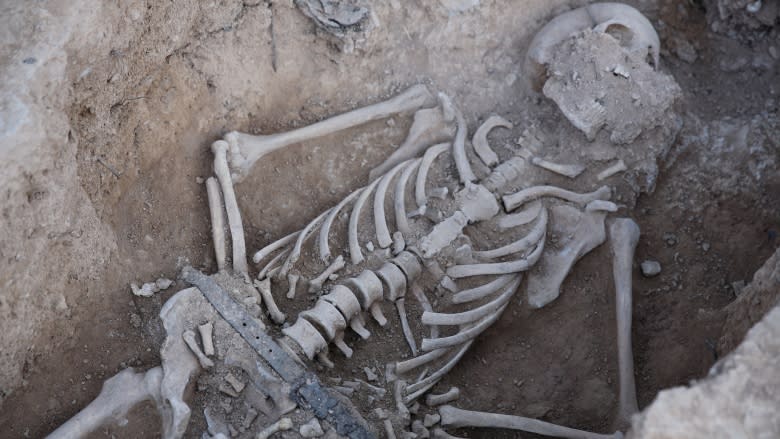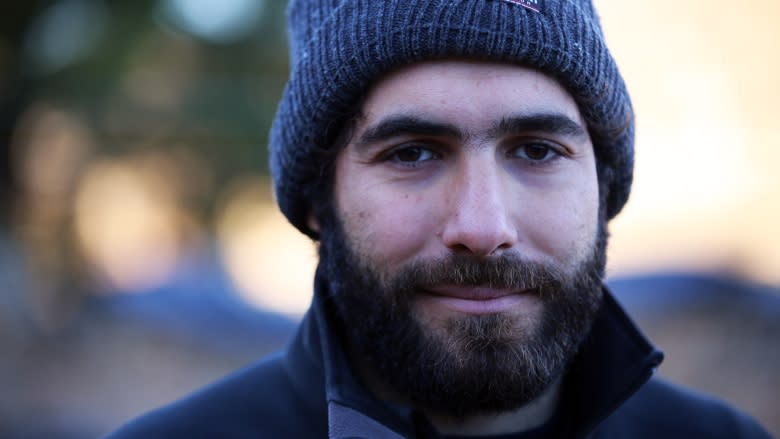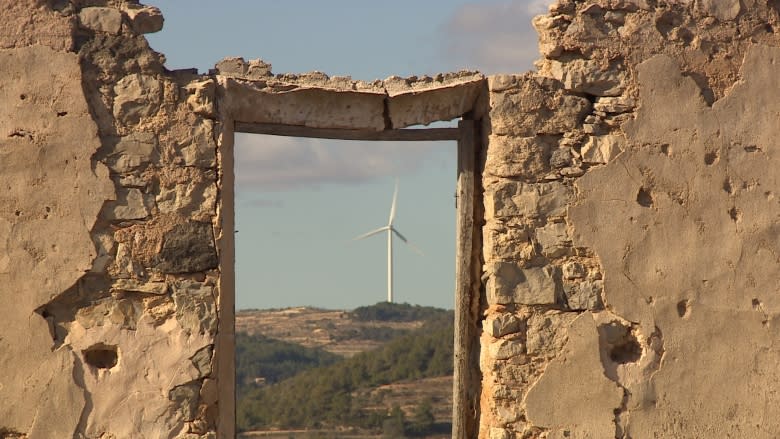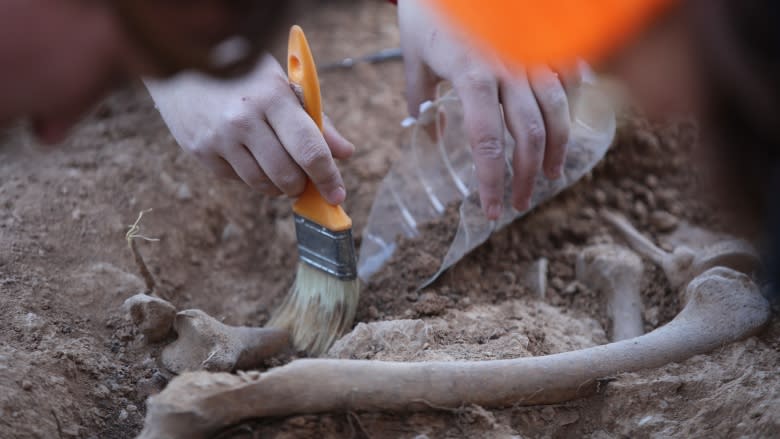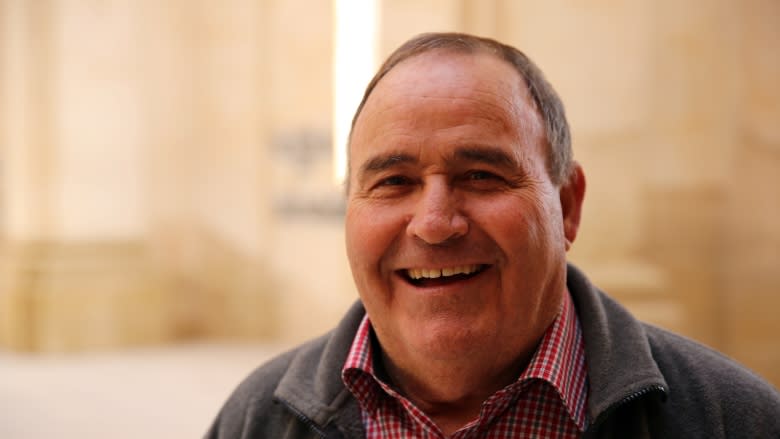In Catalonia, the nameless dead raise old animosities toward Franco
In the Catalan hills west of Barcelona, the nameless dead are emerging from deep layers of earth that have kept them hidden from the world's gaze for some 80 years now.
A skull with a jawbone locked in an eternal grimace, teeth bared, stares up out of the dirt.
Not far away, a skeleton laid out in a long, narrow pit is still wearing shoes and a belt slung around its hipbones. It somehow manages to make it look jaunty.
The remains of an estimated 100 men, and at least one woman, who died near the town of Soleràs during the Spanish Civil War between 1936 and 1939 are being excavated by a team of archeologists.
They kneel around piles of bones in waterproof clothes and tuques, bent with concentration as they sweep dirt away from the bones with small paintbrushes. Some lie flat out on their stomachs next to the pits, scooping up the earth with plastic containers.
They've been at it since August.
"The significance is that this is the biggest [mass grave] that we have dug in Catalonia," says site anthropologist Diego Lopez from the Autonomous University of Barcelona.
"And also [rarely] we find soldiers from both sides in the same cemetery."
The civil war pitted leftist Republicans against right-wing Nationalists backing General Francisco Franco's military uprising.
Soleràs was close to the front line during the battle of the Ebro, one of the bloodiest and most decisive of the war. The town had two hospitals and a mobile field unit.
"We find a lot of evidence of surgical interventions. We find amputations," says Lopez.
There are some 2,000 mass burial sites across Spain, bearing the bodies, it's believed, of more than 100,000 men and women forcibly disappeared during the war and the dictatorship that followed, mainly victims of summary executions by pro-Franco forces.
Yet despite the passage of time, only a handful of the sites have been excavated. There has been no state-run effort to find and identify the dead and offer them a proper burial.
At least not for the Republican side. Franco's victorious forces made an effort to keep track of and bury their own dead, naming them as martyrs.
It is an old wound, one that runs deep and right across the country. In Catalonia, the northeastern region where the independence debate has raised old animosities toward the Franco dictatorship, it feels particularly fresh.
"Most of the people in the [current] Spanish government come from the families that were supporting Franco," says Ramon Gironès, a guide in the nearby town of Corbera d'Ebre. "They have never liked Catalonia much."
Gironès was born in Corbera d'Ebre in 1947. His father fought against Franco's fascists. The town was destroyed by the war and the German bombing raids backing up Franco.
The ruins have been left as monument. It is a place of harsh beauty, perched on a blustery hilltop today overlooking valleys rich with vineyards and olive groves that were once the battlefields of a past that still haunts Spain.
"Thousands of soldiers came by boat through the river," says Gironès, listing off the brigades of foreign volunteers who came to help fight the fascists.
"Lincoln-Washington, the British Battalion and Mackenzie-Papineau from Canada."
About 1,200 Canadians are thought to have fought during the Spanish Civil War, 400 of them losing their lives.
Gironès tells the story of a young boy from the town named Manuel Álvarez who was rescued by a Canadian soldier who disappeared after taking him to hospital.
When Álvarez grew up he sought out his saviour in Canada, finding him in a man named Jim Higgins. Álvarez, now a Canadian citizen, wrote a book about it called The Tall Soldier.
Gironès's attitude toward Madrid is not unusual in Catalonia, far from it. Many Catalans — especially those who back independence from Spain — associate the Spanish Prime Minister Mariano Rajoy and his Popular Parti (PP) with the Franco regime.
The PP's roots lie in a party created by Franco's former information minister after the general's death in 1975. All these years later, analysts say the PP still struggles to sever the link in the eyes of many people.
"It's true that politically the Popular Parti has been reluctant to accept that the Franco regime was a dictatorship," says Xavier Arbos Marin, a constitutional law expert from the University of Barcelona.
Critics blame the disconnect on an amnesty law implemented after the general's death offering impunity to those accused of atrocities during the war and the Franco years.
It's known as the "pact of forgetting," an agreement to leave the past in the past to allow, it was said at the time, for a smooth transition to democracy.
Critics say it has simply allowed resentment to fester, offering the families of Franco's victims no sense of justice or accountability.
In 2007, Spain passed the "Historical Memory Law," introduced by the Socialist government of José Luis Rodriguez Zapatero at the time.
It made public funds available to groups seeking to find and excavate graves, stopping short of having the state take on that responsibility.
Mariano Rajoy stopped that funding when he came to power in 2011, citing the economy. But it was another blow against his government in the eyes of many Catalans who say the fate of Spain's disappeared depends on the political winds of the day.
In 2014, the United Nations Committee on Enforced Disappearances published a report criticizing Spain.
"The search for victims of enforced disappearances and resolving what happened to them are obligations of the state, even when there is no formal claim." it said.
Funding found
It has had little impact. Some of Spain's regions — Navarre and the Basque country, for example — have taken it upon themselves to do some of the work, even setting up DNA databases to help identify the dead.
It was the Catalan regional government that found the funding for and gave the go-ahead to the Soleràs excavation before Catalonia's autonomy was revoked in the midst of the crisis over the region's independence referendum.
"The reason why it hasn't been done before now is politics," says anthropologist Lopez. "The reason why it is being done here [now] is politics as well. If there is no political will you can't do it."
Pro-Madrid critics accuse Catalonian separatists of using the disappeared to hit Rajoy's government over the head for their own political gain.
Greatest drive
But Lopez — who is Basque, not Catalan — says there is nothing political about the desire of people to understand what happened to their loved ones and to have answers.
He points out that the greatest drive for answers over the years has come from the relatives and descendants of the disappeared.
Lopez says he's seen them come to some of this site, and other excavations connected to the conflict.
"They are sad. They are angry. But they are not trying to prove that they suffered more. I mean, they don't want revenge, they just want the truth."
"[The government in Madrid] has a lot of arguments to say why not to reopen [the past.] But sometimes you need to reopen it to close it."

